Sammo Hung, Xu Anhua, Tan Jiaming, Yuan Heping, To Qifeng, Lin Lingdong, Tsui Hark, these seven fantastic names meet in one movie, which in itself is as romantic as a movie. The person who contributed to this romantic story is John To.
The film "The Band of Seven" released on July 29 is a small love song dedicated to the homeland composed by Hong Kong directors in the "Golden Age". To Qifeng has one more identity than other directors: film producer. This idea was proposed by him from the very beginning, and it has been more than 10 years from the idea to the release. The original name was "Eight and a Half", and I wanted eight directors to direct each of them for 10 years in Hong Kong. The last half belonged to the future and was shot with film that has already withdrawn from the film industry. It is not only a tribute to the golden age of movies, but also a tribute to the creators of the film. Master Fellini finds his dream-seeking path back to the original intention of his creation. Later, John Woo withdrew due to physical reasons, and Du Qifeng gave the film the current name.
To Qifeng talks about "Golden Everywhere" in the 2000s, which is also a very distinct presence in the entire series. There is no gunfire, no gangsters, and no need for detectives and secret battles, but from the story to the shot, from the lines to the meaning, it is so accurate that it condenses the consistent temperament of Du's films, loss, fate, absurd and realistic.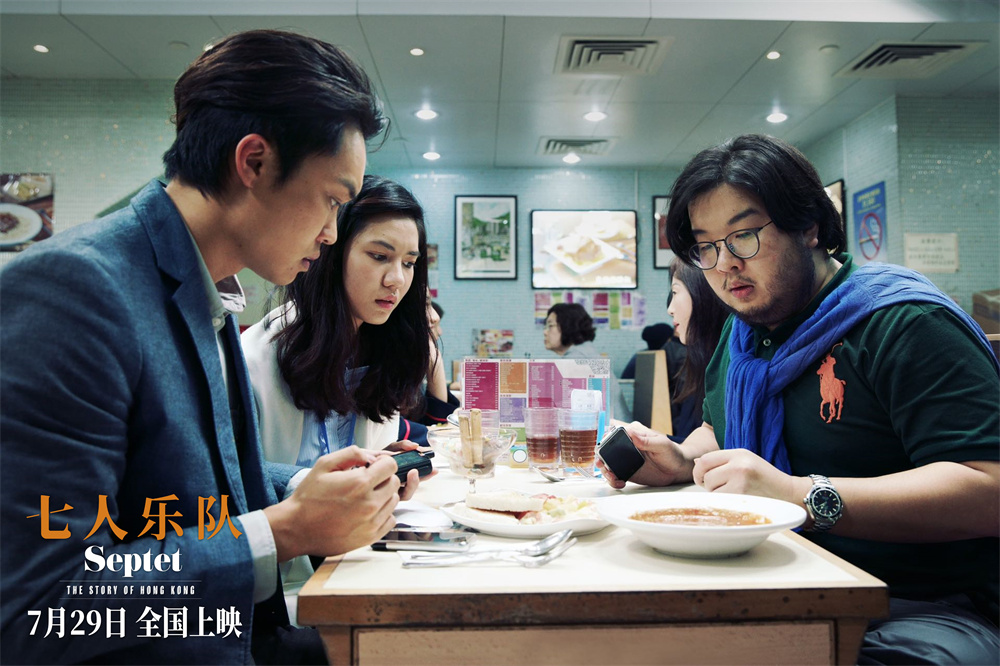
It also focuses on the topic of Hong Kong's property market, stock market, economy and society. This sketch is reminiscent of To Qifeng's "Deadly Gold" filmed 10 years ago. Peeping the leopard from the tube in real life is a subtle abyss of human heart and destiny.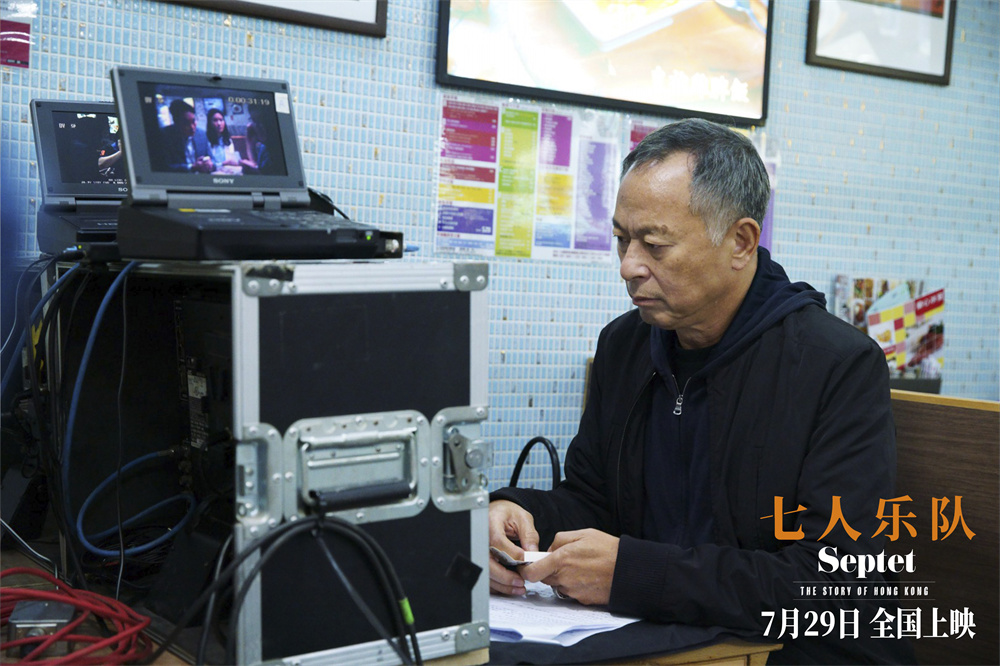
He started from the lowest level of small people, and in the 1980s and 1990s, he shot a large number of Hong Kong-made films that were either popular or not prosperous, from martial arts to romance, from police and gangsters to comedy, almost all genres at his fingertips. In the industrial system of "Oriental Hollywood", To Qifeng is a comprehensive and highly productive all-round director, but in the era of many masters, he is not so outstanding compared to his peers such as John Woo, Tsui Hark, and Wong Kar Wai.
Instead of the typical side, it belongs to the legend shared by him and Galaxy Impression. If he had to choose, Johnnie Du said that his favorite time for Hong Kong movies was the 1990s, which was also the period when he established "Galaxy Image". From then on, he began to truly express himself in movies.
In 1996, when Hong Kong movies were in full decline, John To chose to set up Galaxy Image Film Company with his partners Wei Jiahui and You Dazhi. "In the past, Hong Kong movies also had their own problems. For example, people liked to follow suit too much. When a martial arts movie was a hit, they rushed to shoot martial arts. Romantic love, every type must be soft before giving up." The original intention of the Galaxy Image, which was born out of the sky, was to do something with its own style. And it is these three words "style" that make Galaxy Image one of the most original and author-style movie signs in Hong Kong and even the world.
"The Detective War", which has been in the limelight recently in the summer, is from the hands of John To's golden partner and one of the mainstays of the Milky Way image, Wei Jiahui. I can't help but miss the pearl and jade predecessor "Detective", which was once more sharp and profound, and jointly produced by To Qifeng and Wei Jiahui.
In the tide of Hong Kong directors going north in the new century, To Qifeng sticks to local creation. In the increasingly sluggish years of Hong Kong movies, he always wanted to do more for Hong Kong movies. In 2005, John To participated in the election of the Hong Kong Arts Development Council and became the chairman of the film group. The "Fresh Wave" founded by him has cultivated a group of Hong Kong's new generation of filmmakers including Chen Xiaojuan, Li Junshuo, Huang Jin, Xu Xuewen, etc. On To Qifeng's 60th birthday in 2015, guests were advised not to give gifts, but to donate money to "Fresh Wave" to help new directors. In his heart, Hong Kong cinema is a big family, and he always wants to save more energy for the younger generation.
"I really want us all to concentrate our efforts and tell the new generation of young people that we Hong Kong directors are united. Although we have served in different companies in the past, we are all in the film industry. Yes. I very much hope that what this group and this group of people have made can encourage and help future generations of directors, and let the younger generation know that the unity of our Hong Kong films is the most important thing." To Qifeng Say.
Before the film was released, director To Qifeng was interviewed by The Paper, and talked about his complexes with film, Hong Kong films and Hong Kong.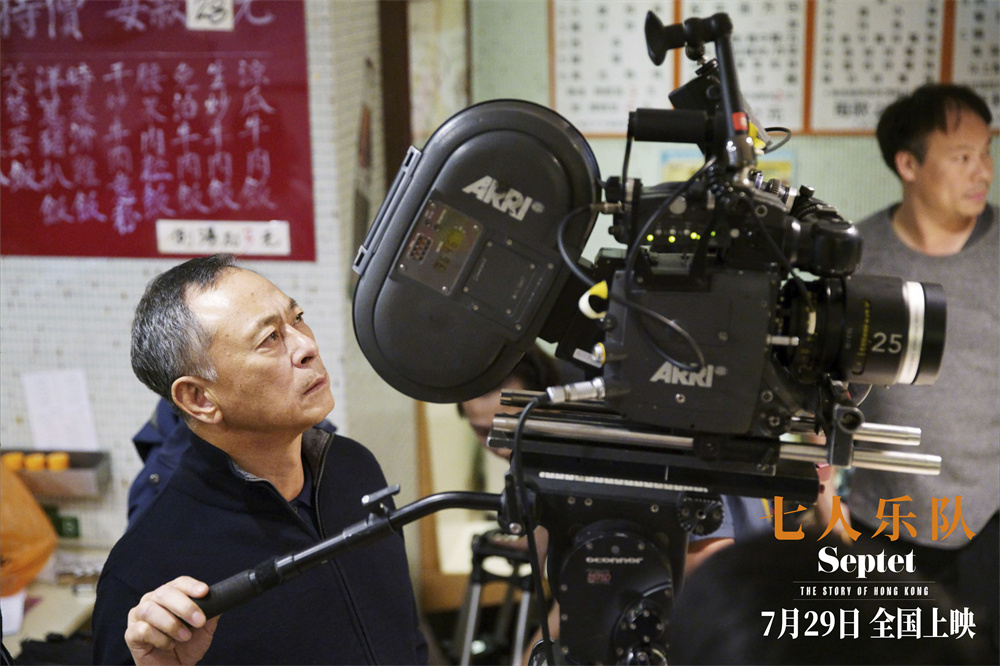
Seven solos, "playing" Hong Kong together
The Paper : In "The Band of Seven", you have more identity than others as a producer, and the whole idea was also proposed by you. How did you think of bringing everyone together in such a way?
Johnnie To : First of all, I want to talk about why there is the idea of "band". In 2010, when we started to make movies without film (ie film), I felt that because of the existence of film and the existence of film, there were directors like us. Because the film has recorded many well-known and successful films in Hong Kong, and they have gathered many actors and have a lot of Hong Kong culture. I think it has made a considerable contribution to Hong Kong. The disappearance of the film is really a pity. I don't think there will be any Hong Kong movies without the film. I have an idea, should we pay some respect to Film? So I thought, I can find a group of directors and shoot with film again, maybe the last time. The basic idea is to respect it.
With this tool, what should we talk about? I think we should talk about Hong Kong. The theme is to tell one (story) every decade from the 1950s until 2020. Different directors will have different ideas, and they will use the method of drawing lots to talk about what they want to talk about. Overall, this is a tribute to Hong Kong and to Film.
I think the current situation in Hong Kong has given many Hong Kong directors a lot of opportunities to go to the mainland to develop or do their own work. Over the years, we seem to have paid less attention to Hong Kong movies than before. I very much hope that this film, in addition to commemorating the film, will also become a tool to record the best era of our Hong Kong.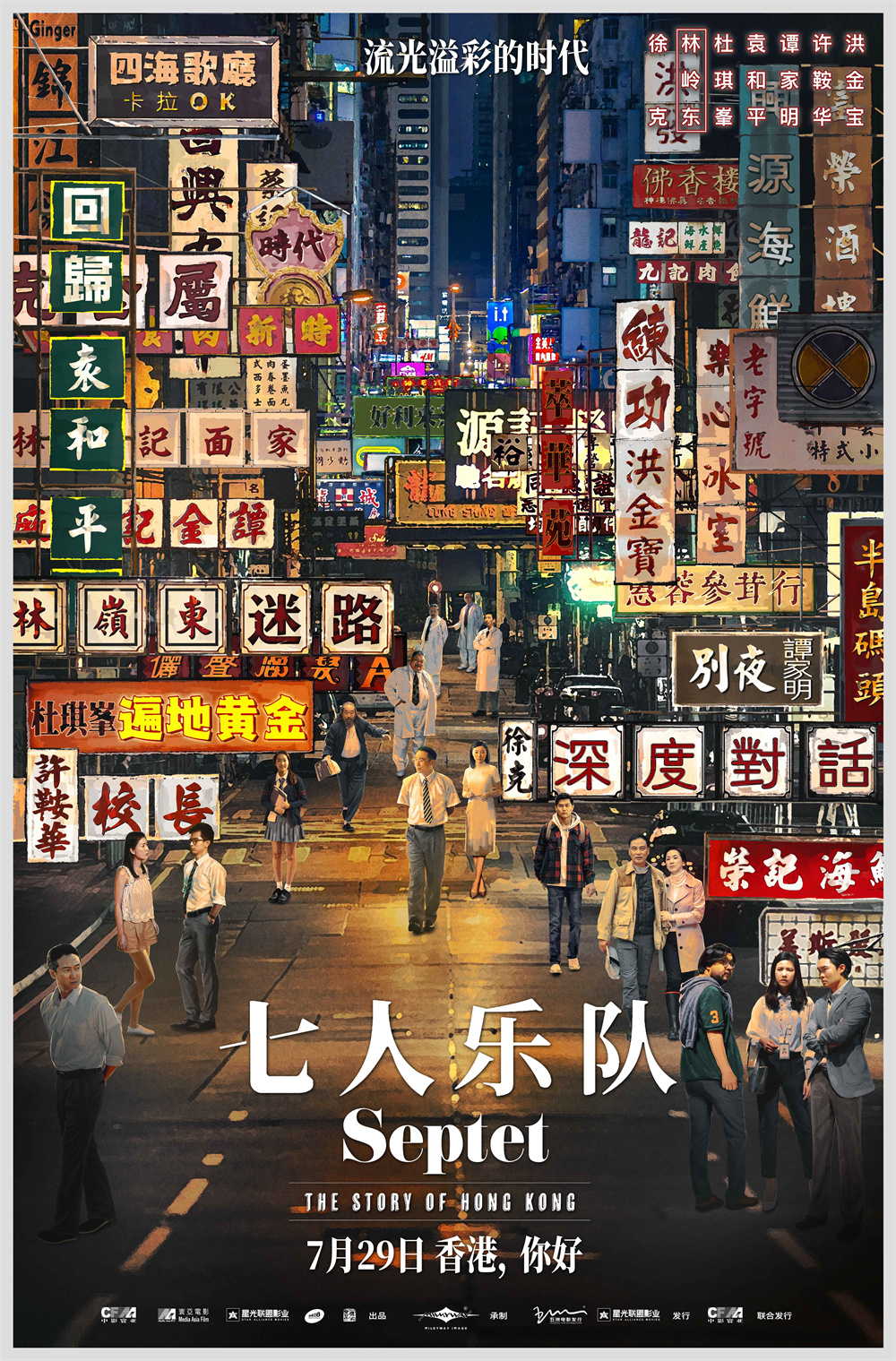
Johnnie Du : Actually, it doesn't matter what the name is. Instead, there are seven people in a band, playing together some bits and pieces of Hong Kong in different eras. This is the core meaning.
There are seven of us, and everyone is the lead singer! Everyone has their own characteristics. Everyone has a solo, one per person, and the most important thing is the information conveyed by the seven solos combined, telling the story about Hong Kong. We are talking about the Hong Kong we have experienced. After going through these seven different units, there will be some common things.
The Paper : This project spanned a very long time. Are there any surprises and surprises in the final result?
Johnnie To : I don't even know what it was at the beginning. I only know that it was filming and talking about Hong Kong. This is a major premise. But the effect to be achieved, I never imagined. When I watched the whole film, I felt much better than I thought, it was more intense and more emotional than I thought. I myself was aroused by different moods, a lot of things in different passages. After watching it, I was very moved, there is such a movie. Surprisingly, after watching the episode of Lin Lingdong, I never thought that I had known him for so long before I realized that there is another Lin Lingdong in his body, who can make such a literary movie. This is something I couldn't imagine before.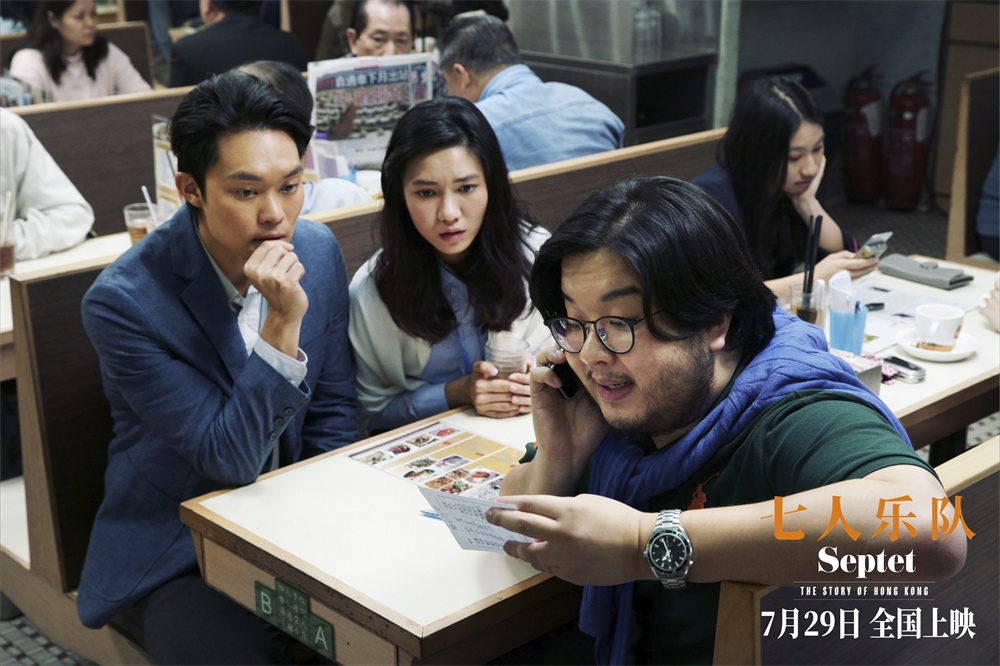
Johnnie To : It's obvious to everyone that the new generation of Hong Kong films doesn't seem to have seen much success. I think in terms of inheritance, creative work needs people, both behind the scenes and behind the scenes. If you pay attention, you will see that the directors of Hong Kong, such as our "Band of Seven" director, are all over 60 years old. Obviously, the new generation of directors may not be recognized by you, and they will need time to prove themselves.
In terms of actors, you can see that Andy Lau, Tony Leung, and Chow Yun-fat are all over 60 years old. Will you see that Hong Kong has lost its ability to sustain? I think it's pretty obvious to tell you, yes, that's the case. But I will not be too pessimistic, because I think different eras will have different effects, and its current shortage does not necessarily mean that it will always be short.
As everyone knows recently, there is a very famous group in Hong Kong called Mirror. Suddenly, 12 people became popular. I was very happy when I saw this, because a new generation of artists appeared. In addition, (I also) have seen a lot of different new directors appear in the past ten years. I think their future will be bright as long as there is a platform for them to shoot. I don't think Hong Kong films, or Hong Kong filmmakers, will have no prospects on the larger platform.
Concerned about where Hong Kong is going, it's normal to "slow down" filming
The Paper : When it comes to your own creation of "Golden Everywhere", how is the feeling of shooting a short film different from that of a feature film? What was your first reaction to being drawn to 2000?
Johnnie To : Actually, two minutes, 10 minutes, or 20 minutes are not too difficult for me. The hard part is to know what to talk about and what the topic should be, but this is something you have to think hard about.
In terms of time, I like each era very much, because from the time I was born to the present, I like Hong Kong very much. I drew the year 2000, and I thought it was a lot of fun, because I have a deep memory of what happened in 2000, and it was easier to write about that content. But I don't mind drawing from any age, because I have some different opinions in each age.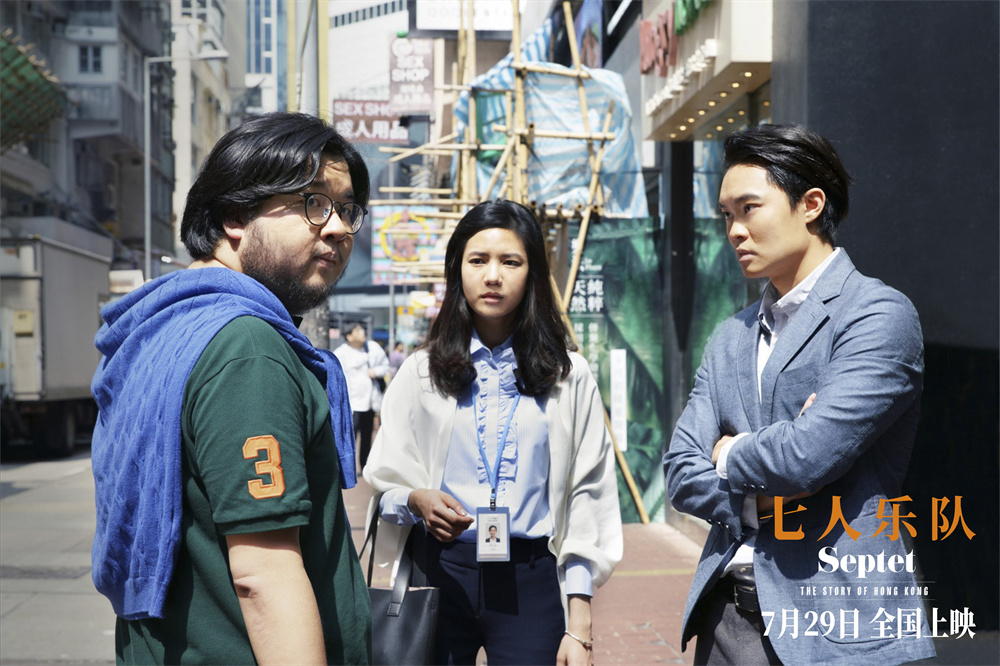
Johnnie To : Honestly, the intention of creating "Golden Life" is different from "Golden Everywhere". In terms of creative intent, "Deadly Gold" is about some "sugar-coated" administrations (means), while "Everywhere Gold" is about greed and fear. Of course, they are all talking about Hong Kong's economy, real estate, commerce, or financial markets. The reason why these two films are similar is that when we talk about Hong Kong a lot, we will talk about Hong Kong's property prices and Hong Kong's financial market, because these two are almost Hong Kong's "famous brands". Hong Kong's property prices are almost the most expensive in the world, and Hong Kong is also the world's third-largest financial market. These backgrounds also form the basis for me to use these themes to express what I want to say.
The Paper : It is also from the perspective of a small person to reflect some of your reflections on the economy and society, including the impact of the external environment on people. Ten years have passed since "Golden Life" and "Golden Everywhere", and the Hong Kong and Hong Kong people you observe What has changed?
Johnnie To : I was born in the 1950s. By the 2020s, the first three major economic ups and downs have been reproduced in different short films, enabling Hong Kong to continue to move forward. I think it's an opportunity. This opportunity, in the final analysis, is the greed and fear I talked about in "Gold everywhere", how do you deal with your greed and your fear.
The Paper : You have always been a model director with both commercial and personal expressions of "walking on two legs" among Hong Kong directors. I wonder if your state will be different when you are making these two films?
Johnnie To : Very different. If I were a commercial director, I would consider the audience a little more. How do they react in the movie theater, or how my story drives their emotions, this is from the audience's level to consider the creation.
If it is some very personal, such as personal movies, my own homework or works, I will not pay too much attention to the audience's reaction, but will focus on what I want to express.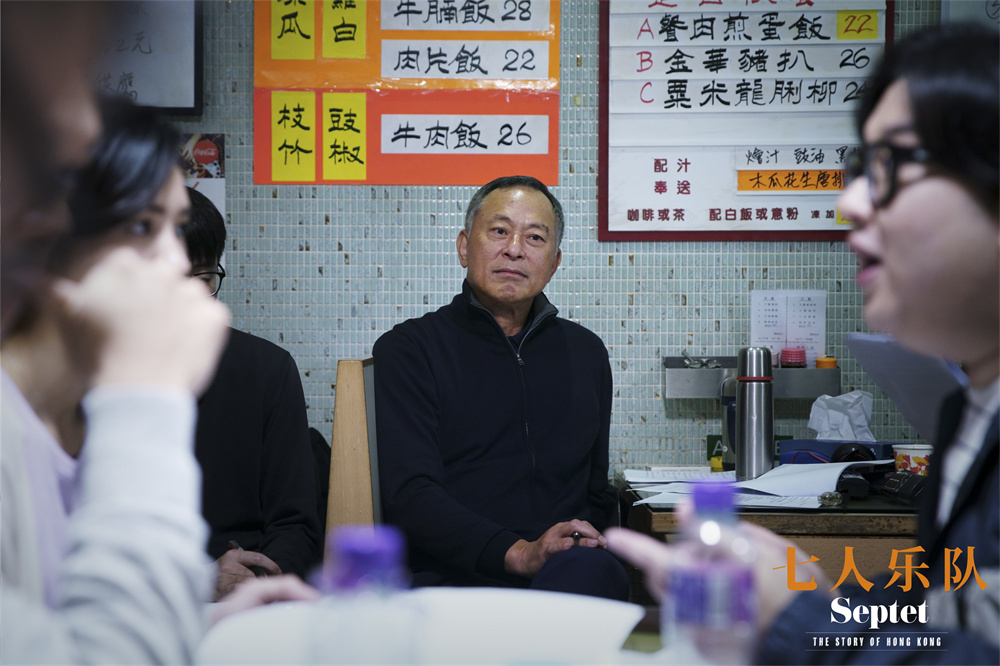
To Qifeng : I am 67 years old now, it is inevitable to slow down. Many times, I want to be faster, but I may not be able to catch up mentally. I knew this was going to happen, I thought it would happen early on. I don't think it's a problem either, physically and emotionally, it's normal. The idea of continuing to make movies has never stopped. As long as I can make movies, I will definitely continue to make them. As for fast and slow, it is no longer something I will consider. If I have more inspiration, I may shoot faster and more; if I need a precipitation, I think I need to calm down.
The Paper : Count the director lineup of your "Band of Seven". You are a generation. You have experienced the golden age of movies together, experienced the ups and downs and the trend of going north. Your styles and choices are also different. I would like to hear your summary. Your generation of filmmakers? Which period do you like best?
Johnnie To : I am very lucky. I was one of the workers when Hong Kong was at its best. Until now, I have been able to participate in film work, which is very rare. With the changing times, many things need to be adapted. If you can adapt, keep doing it.
Later, almost every director would go to the mainland to film, but I have a contradiction all the time, that is, I don’t understand the way of life in the mainland, and I will not be able to touch the pulse of the society or the audience so easily. Just like when you visit me now, I can't speak Mandarin, so you will understand where my problem is. The film culture must be connected to that place, which is the so-called grounded atmosphere. I'm the one who has a harder time getting to the ground. Since I can't get it, I will look for a place where I know how to express it, such as Hong Kong.
I would love Hong Kong in the 1990s and 2000s, and I am in very good shape myself.
The Paper : There should be some regrets in the series "Band of Seven", right? For example, it became the posthumous work of director Lin Lingdong, and director John Woo failed to join in the end.
To Qifeng : I think his (Lin Lingdong) departure was very sudden. From the last dinner he had with me to the last time he was cremated, it was not enough for a month. Tsui Hark had a good time chatting, talking about movies and drinking. We didn't know that was the last meal. I feel very lucky that our three friends have such a happy time, everyone is full of hope for the future, this is God's arrangement, tell us that your enthusiasm is here.
It is also a great regret that John Woo was not able to come together. Of course it would be better if eight directors could do it together. There will always be regrets about some things, and it's possible that those regrets will be the things you will always remember in Band of Seven.
(The Paper reporter Cheng Yu also contributed to this article)
The film "The Band of Seven" released on July 29 is a small love song dedicated to the homeland composed by Hong Kong directors in the "Golden Age". To Qifeng has one more identity than other directors: film producer. This idea was proposed by him from the very beginning, and it has been more than 10 years from the idea to the release. The original name was "Eight and a Half", and I wanted eight directors to direct each of them for 10 years in Hong Kong. The last half belonged to the future and was shot with film that has already withdrawn from the film industry. It is not only a tribute to the golden age of movies, but also a tribute to the creators of the film. Master Fellini finds his dream-seeking path back to the original intention of his creation. Later, John Woo withdrew due to physical reasons, and Du Qifeng gave the film the current name.

"Seven" director poster
Seven stories and seven periods of life, some people look back fondly on the past of Kung Fu inherited from master and apprentice, some lament the youthful years of being forced to leave, some linger lyrically between long-distance travel and return, and some create a strange space where the absurdity and reality cannot be distinguished... …The directors have a distinct style, and fans can tell who wrote this chapter without having to read the subtitles.To Qifeng talks about "Golden Everywhere" in the 2000s, which is also a very distinct presence in the entire series. There is no gunfire, no gangsters, and no need for detectives and secret battles, but from the story to the shot, from the lines to the meaning, it is so accurate that it condenses the consistent temperament of Du's films, loss, fate, absurd and realistic.

Stills of "Gold Everywhere"
"Golden Everywhere" is a fortune dream of ordinary young people in a wave of the times. In Hong Kong after the millennium, three small citizens are eager to get rich overnight. In the conversation in the cafeteria, To Qifeng quietly outlines the various forms of living beings in "business opportunities and crises". The sense of the times and the sense of destiny are intertwined between the square inches of the small booth. Under the verbal confrontation between you and me, the society and human nature have a pair of overturned hands, and the ups and downs of the ants-like little people in the big era are firmly grasped.It also focuses on the topic of Hong Kong's property market, stock market, economy and society. This sketch is reminiscent of To Qifeng's "Deadly Gold" filmed 10 years ago. Peeping the leopard from the tube in real life is a subtle abyss of human heart and destiny.

Director To Qifeng
Johnnie To is a very typical and atypical Hong Kong director who has benefited from Hong Kong movies. To say that he is typical is that he has undertaken the path of the golden generation from the wireless training class. Du Qifeng, who was born in 1955, entered Hong Kong TVB at the age of 17, and then participated in TVB's famous actor training class. But after the training class, Du Qifeng did not become a star-studded actor in movies or TV dramas like most of his classmates, but became an assistant director, thus embarking on the road of creator.He started from the lowest level of small people, and in the 1980s and 1990s, he shot a large number of Hong Kong-made films that were either popular or not prosperous, from martial arts to romance, from police and gangsters to comedy, almost all genres at his fingertips. In the industrial system of "Oriental Hollywood", To Qifeng is a comprehensive and highly productive all-round director, but in the era of many masters, he is not so outstanding compared to his peers such as John Woo, Tsui Hark, and Wong Kar Wai.
Instead of the typical side, it belongs to the legend shared by him and Galaxy Impression. If he had to choose, Johnnie Du said that his favorite time for Hong Kong movies was the 1990s, which was also the period when he established "Galaxy Image". From then on, he began to truly express himself in movies.
In 1996, when Hong Kong movies were in full decline, John To chose to set up Galaxy Image Film Company with his partners Wei Jiahui and You Dazhi. "In the past, Hong Kong movies also had their own problems. For example, people liked to follow suit too much. When a martial arts movie was a hit, they rushed to shoot martial arts. Romantic love, every type must be soft before giving up." The original intention of the Galaxy Image, which was born out of the sky, was to do something with its own style. And it is these three words "style" that make Galaxy Image one of the most original and author-style movie signs in Hong Kong and even the world.
"The Detective War", which has been in the limelight recently in the summer, is from the hands of John To's golden partner and one of the mainstays of the Milky Way image, Wei Jiahui. I can't help but miss the pearl and jade predecessor "Detective", which was once more sharp and profound, and jointly produced by To Qifeng and Wei Jiahui.
In the tide of Hong Kong directors going north in the new century, To Qifeng sticks to local creation. In the increasingly sluggish years of Hong Kong movies, he always wanted to do more for Hong Kong movies. In 2005, John To participated in the election of the Hong Kong Arts Development Council and became the chairman of the film group. The "Fresh Wave" founded by him has cultivated a group of Hong Kong's new generation of filmmakers including Chen Xiaojuan, Li Junshuo, Huang Jin, Xu Xuewen, etc. On To Qifeng's 60th birthday in 2015, guests were advised not to give gifts, but to donate money to "Fresh Wave" to help new directors. In his heart, Hong Kong cinema is a big family, and he always wants to save more energy for the younger generation.
"I really want us all to concentrate our efforts and tell the new generation of young people that we Hong Kong directors are united. Although we have served in different companies in the past, we are all in the film industry. Yes. I very much hope that what this group and this group of people have made can encourage and help future generations of directors, and let the younger generation know that the unity of our Hong Kong films is the most important thing." To Qifeng Say.
Before the film was released, director To Qifeng was interviewed by The Paper, and talked about his complexes with film, Hong Kong films and Hong Kong.

Johnnie at work
【dialogue】Seven solos, "playing" Hong Kong together
The Paper : In "The Band of Seven", you have more identity than others as a producer, and the whole idea was also proposed by you. How did you think of bringing everyone together in such a way?
Johnnie To : First of all, I want to talk about why there is the idea of "band". In 2010, when we started to make movies without film (ie film), I felt that because of the existence of film and the existence of film, there were directors like us. Because the film has recorded many well-known and successful films in Hong Kong, and they have gathered many actors and have a lot of Hong Kong culture. I think it has made a considerable contribution to Hong Kong. The disappearance of the film is really a pity. I don't think there will be any Hong Kong movies without the film. I have an idea, should we pay some respect to Film? So I thought, I can find a group of directors and shoot with film again, maybe the last time. The basic idea is to respect it.
With this tool, what should we talk about? I think we should talk about Hong Kong. The theme is to tell one (story) every decade from the 1950s until 2020. Different directors will have different ideas, and they will use the method of drawing lots to talk about what they want to talk about. Overall, this is a tribute to Hong Kong and to Film.
I think the current situation in Hong Kong has given many Hong Kong directors a lot of opportunities to go to the mainland to develop or do their own work. Over the years, we seem to have paid less attention to Hong Kong movies than before. I very much hope that this film, in addition to commemorating the film, will also become a tool to record the best era of our Hong Kong.

"The Band of Seven" poster
The Paper : It is said that you came up with the title of "The Band of Seven". What kind of instruments do you think the directors are?Johnnie Du : Actually, it doesn't matter what the name is. Instead, there are seven people in a band, playing together some bits and pieces of Hong Kong in different eras. This is the core meaning.
There are seven of us, and everyone is the lead singer! Everyone has their own characteristics. Everyone has a solo, one per person, and the most important thing is the information conveyed by the seven solos combined, telling the story about Hong Kong. We are talking about the Hong Kong we have experienced. After going through these seven different units, there will be some common things.
The Paper : This project spanned a very long time. Are there any surprises and surprises in the final result?
Johnnie To : I don't even know what it was at the beginning. I only know that it was filming and talking about Hong Kong. This is a major premise. But the effect to be achieved, I never imagined. When I watched the whole film, I felt much better than I thought, it was more intense and more emotional than I thought. I myself was aroused by different moods, a lot of things in different passages. After watching it, I was very moved, there is such a movie. Surprisingly, after watching the episode of Lin Lingdong, I never thought that I had known him for so long before I realized that there is another Lin Lingdong in his body, who can make such a literary movie. This is something I couldn't imagine before.

Stills of "Gold Everywhere"
The Paper : The director lineup of the entire "Band of Seven" is a group of old directors in their 60s and 70s, but in the choice of actors, you chose to cooperate with three new actors, Wu Yongshi, Hutong, and Xu Haochang. Is there something about it? Inheritance considerations?Johnnie To : It's obvious to everyone that the new generation of Hong Kong films doesn't seem to have seen much success. I think in terms of inheritance, creative work needs people, both behind the scenes and behind the scenes. If you pay attention, you will see that the directors of Hong Kong, such as our "Band of Seven" director, are all over 60 years old. Obviously, the new generation of directors may not be recognized by you, and they will need time to prove themselves.
In terms of actors, you can see that Andy Lau, Tony Leung, and Chow Yun-fat are all over 60 years old. Will you see that Hong Kong has lost its ability to sustain? I think it's pretty obvious to tell you, yes, that's the case. But I will not be too pessimistic, because I think different eras will have different effects, and its current shortage does not necessarily mean that it will always be short.
As everyone knows recently, there is a very famous group in Hong Kong called Mirror. Suddenly, 12 people became popular. I was very happy when I saw this, because a new generation of artists appeared. In addition, (I also) have seen a lot of different new directors appear in the past ten years. I think their future will be bright as long as there is a platform for them to shoot. I don't think Hong Kong films, or Hong Kong filmmakers, will have no prospects on the larger platform.
Concerned about where Hong Kong is going, it's normal to "slow down" filming
The Paper : When it comes to your own creation of "Golden Everywhere", how is the feeling of shooting a short film different from that of a feature film? What was your first reaction to being drawn to 2000?
Johnnie To : Actually, two minutes, 10 minutes, or 20 minutes are not too difficult for me. The hard part is to know what to talk about and what the topic should be, but this is something you have to think hard about.
In terms of time, I like each era very much, because from the time I was born to the present, I like Hong Kong very much. I drew the year 2000, and I thought it was a lot of fun, because I have a deep memory of what happened in 2000, and it was easier to write about that content. But I don't mind drawing from any age, because I have some different opinions in each age.

Stills of "Gold Everywhere"
The Paper : Fans who are familiar with you read the chapter of "Golden Everywhere", and it is easy to think of your other film "Death of Gold". Is the creation in the same line as "Death of Gold"?Johnnie To : Honestly, the intention of creating "Golden Life" is different from "Golden Everywhere". In terms of creative intent, "Deadly Gold" is about some "sugar-coated" administrations (means), while "Everywhere Gold" is about greed and fear. Of course, they are all talking about Hong Kong's economy, real estate, commerce, or financial markets. The reason why these two films are similar is that when we talk about Hong Kong a lot, we will talk about Hong Kong's property prices and Hong Kong's financial market, because these two are almost Hong Kong's "famous brands". Hong Kong's property prices are almost the most expensive in the world, and Hong Kong is also the world's third-largest financial market. These backgrounds also form the basis for me to use these themes to express what I want to say.
The Paper : It is also from the perspective of a small person to reflect some of your reflections on the economy and society, including the impact of the external environment on people. Ten years have passed since "Golden Life" and "Golden Everywhere", and the Hong Kong and Hong Kong people you observe What has changed?
Johnnie To : I was born in the 1950s. By the 2020s, the first three major economic ups and downs have been reproduced in different short films, enabling Hong Kong to continue to move forward. I think it's an opportunity. This opportunity, in the final analysis, is the greed and fear I talked about in "Gold everywhere", how do you deal with your greed and your fear.
The Paper : You have always been a model director with both commercial and personal expressions of "walking on two legs" among Hong Kong directors. I wonder if your state will be different when you are making these two films?
Johnnie To : Very different. If I were a commercial director, I would consider the audience a little more. How do they react in the movie theater, or how my story drives their emotions, this is from the audience's level to consider the creation.
If it is some very personal, such as personal movies, my own homework or works, I will not pay too much attention to the audience's reaction, but will focus on what I want to express.

To Qifeng at the shooting site
The Paper : In the past, you were considered to be the most creative echelon of Hong Kong directors, but the frequency of creation has dropped significantly in recent years. It has been six years since "Three Lines". How do you see your current creations?To Qifeng : I am 67 years old now, it is inevitable to slow down. Many times, I want to be faster, but I may not be able to catch up mentally. I knew this was going to happen, I thought it would happen early on. I don't think it's a problem either, physically and emotionally, it's normal. The idea of continuing to make movies has never stopped. As long as I can make movies, I will definitely continue to make them. As for fast and slow, it is no longer something I will consider. If I have more inspiration, I may shoot faster and more; if I need a precipitation, I think I need to calm down.
The Paper : Count the director lineup of your "Band of Seven". You are a generation. You have experienced the golden age of movies together, experienced the ups and downs and the trend of going north. Your styles and choices are also different. I would like to hear your summary. Your generation of filmmakers? Which period do you like best?
Johnnie To : I am very lucky. I was one of the workers when Hong Kong was at its best. Until now, I have been able to participate in film work, which is very rare. With the changing times, many things need to be adapted. If you can adapt, keep doing it.
Later, almost every director would go to the mainland to film, but I have a contradiction all the time, that is, I don’t understand the way of life in the mainland, and I will not be able to touch the pulse of the society or the audience so easily. Just like when you visit me now, I can't speak Mandarin, so you will understand where my problem is. The film culture must be connected to that place, which is the so-called grounded atmosphere. I'm the one who has a harder time getting to the ground. Since I can't get it, I will look for a place where I know how to express it, such as Hong Kong.
I would love Hong Kong in the 1990s and 2000s, and I am in very good shape myself.
The Paper : There should be some regrets in the series "Band of Seven", right? For example, it became the posthumous work of director Lin Lingdong, and director John Woo failed to join in the end.
To Qifeng : I think his (Lin Lingdong) departure was very sudden. From the last dinner he had with me to the last time he was cremated, it was not enough for a month. Tsui Hark had a good time chatting, talking about movies and drinking. We didn't know that was the last meal. I feel very lucky that our three friends have such a happy time, everyone is full of hope for the future, this is God's arrangement, tell us that your enthusiasm is here.
It is also a great regret that John Woo was not able to come together. Of course it would be better if eight directors could do it together. There will always be regrets about some things, and it's possible that those regrets will be the things you will always remember in Band of Seven.
(The Paper reporter Cheng Yu also contributed to this article)










Comments